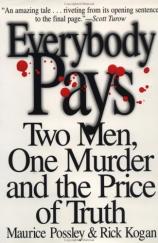Everybody Pays
Review
Everybody Pays
Bob Lowe's father told him not to get involved. Just keep his mouth
shut and forget everything he saw. But to the 25-year-old blue
collar mechanic, husband, and father, that was entirely out of the
question. How could he? While walking his dog he saw his
acquaintance, Billy Logan, murdered on the street right in front of
him. And more importantly, he held the triggerman's gaze for four
frightening seconds, enough to easily identify him in a mug shot
book, lineup, or court chambers. In Lowe's mind, it was his simple
duty as a citizen to I.D. the guy and put a killer behind
bars.
But Bob Lowe's seemingly straightforward decision to do that duty
in 1972 provided the catalyst for a 25-year hellish personal
odyssey, all while being constantly on the move and looking over
his shoulder for the bullet with his name on it. That's because the
face that Lowe saw didn't belong to any garden variety street thug,
but that of Harry Aleman, the feared, proficient and very busy hit
man for the Chicago mob. And Harry had a lot of powerful
friends.
EVERYBODY PAYS is not the story of Logan or even Aleman, but of how
Lowe's life began to spiral out of control after his agreeing to
testify. Little did he know that larger forces were literally
conspiring against him. Although he positively identified Aleman
immediately following the shooting, the corrupt investigating cops
buried the information for four years. At the eventual trial, the
presiding judge had been bribed, deeming Lowe "a liar" in open
court. Left dangling when Aleman was acquitted --- and in real fear
for their lives --- the Lowes entered the Witness Protection
Program, beginning a harrowing litany of changes in their
residence, job, lifestyles, and even identities.
The constant pressure drove Lowe to extended flirtations with
booze, cocaine, petty crime, and estrangement from his family.
After years of bitter thoughts and second-guessing of his actions,
Lowe eventually does crawl back. The book closes with Aleman's 1997
retrial --- a historic overturning of the Constitutional "double
jeopardy" clause --- and ultimate vindication for Lowe, who as an
older, grayer man found himself giving the same testimony that he
had 20 years earlier.
Possley and Kogan --- both experienced journalists for the
Chicago Tribune --- keep the narrative fast-paced, to the
point and interesting. They also know their turf well, particularly
in their discussion of the hierarchy of the Chicago Mafia and how
it differs from its flashier, more storied New York counterpart.
Drawing on historical material as well as fresh interviews from
most of the participants (save the incarcerated Aleman, who refused
to talk with them), the pair paint a sympathetic but even-keeled
portrait of Lowe, who was not entirely blameless for his subsequent
misfortunes.
Ultimately, the large and looming question that hangs throughout
the book is this: Was it all worth it? Was it worth it for Lowe to
go through his own seven circles of hell for doing what he
initially felt would be a simple and just action, or should he have
heeded his father's advice to go deaf, dumb, and blind? The reader
is left to ponder that for themselves --- as well as think about
what they'd do in a similar situation. In either case, the book's
title stands as both a warning and a thesis: in crime, everyone
does pay --- and not just the guilty.
Reviewed by Bob Ruggiero on January 21, 2011
Everybody Pays
- Publication Date: October 1, 2001
- Genres: Nonfiction, True Crime
- Hardcover: 276 pages
- Publisher: Putnam Adult
- ISBN-10: 0399148108
- ISBN-13: 9780399148101



